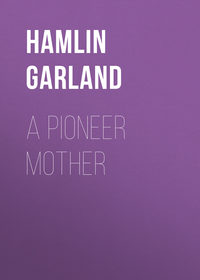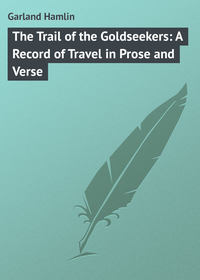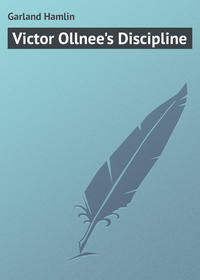 полная версия
полная версияA Son of the Middle Border
In order to reach my cabin before darkness fell, I urged my team desperately, and it was well that I did, for I could scarcely see my horses during the last mile, and the wind was appalling even to me – an experienced plainsman. Arriving at the barn I was disheartened to find the doors heavily banked with snow, but I fell to in desperate haste, and soon shoveled a passageway.
This warmed me, but in the delay one of my horses became so chilled that he could scarcely enter his stall. He refused to eat also, and this troubled me very much. However, I loaded him with blankets and fell to work rubbing his legs with wisps of hay, to start the circulation, and did not desist until the old fellow began nibbling his forage.
By this time the wind was blowing seventy miles an hour, and black darkness was upon the land. With a rush I reached my shanty only to find that somebody had taken all my coal and nearly all my kindling, save a few pieces of pine. This was serious, but I kindled a fire with the blocks, a blaze which was especially grateful by reason of its quick response.
Hardly was the stove in action, when a rap at the door startled me. "Come," I shouted. In answer to my call, a young man, a neighbor, entered, carrying a sack filled with coal. He explained with some embarrassment, that in his extremity during the preceding blizzard, he had borrowed from my store, and that (upon seeing my light) he had hurried to restore the fuel, enough, at any rate, to last out the night. His heroism appeased my wrath and I watched him setting out on his return journey with genuine anxiety.
That night is still vivid in my memory. The frail shanty, cowering close, quivered in the wind like a frightened hare. The powdery snow appeared to drive directly through the solid boards, and each hour the mercury slowly sank. Drawing my bed close to the fire, I covered myself with a buffalo robe and so slept for an hour or two.
When I woke it was still dark and the wind, though terrifying, was intermittent in its attack. The timbers of the house creaked as the blast lay hard upon it, and now and again the faint fine crystals came sifting down upon my face, – driven beneath the shingles by the tempest. At last I lit my oil lamp and shivered in my robe till dawn. I felt none of the exultation of a "king in fairyland" nor that of a "lord of the soil."
The morning came, bright with sun but with the thermometer forty degrees below zero. It was so cold that the horses refused to face the northwest wind. I could not hitch them to the sleigh until I had blanketed them both beneath their harness; even then they snorted and pawed in terror. At last, having succeeded in hooking the traces I sprang in and, wrapping the robe about me, pushed eastward with all speed, seeking food and fire.
This may be taken as a turning point in my career, for this experience (followed by two others almost as severe) permanently chilled my enthusiasm for pioneering the plain. Never again did I sing "Sunset Regions" with the same exultant spirit. "O'er the hills in legions, boys," no longer meant sunlit savannahs, flower meadows and deer-filled glades. The mingled "wood and prairie land" of the song was gone and Uncle Sam's domain, bleak, semi-arid, and wind-swept, offered little charm to my imagination. From that little cabin on the ridge I turned my face toward settlement, eager to escape the terror and the loneliness of the treeless sod. I began to plan for other work in other airs.
Furthermore, I resented the conditions under which my mother lived and worked. Our home was in a small building next to the shop, and had all the shortcomings of a cabin and none of its charm. It is true nearly all our friends lived in equal discomfort, but it seemed to me that mother had earned something better. Was it for this she had left her home in Iowa. Was she never to enjoy a roomy and comfortable dwelling?
She did not complain and she seldom showed her sense of discomfort. I knew that she longed for the friends and neighbors she had left behind, and yet so far from being able to help her I was even then planning to leave her.
In a sullen rage I endured the winter and when at last the sun began to ride the sky with fervor and the prairie cock announced the spring, hope of an abundant crop, the promise of a new railroad, the incoming of jocund settlers created in each of us a confidence which expressed itself in a return to the land. With that marvellous faith which marks the husbandmen, we went forth once more with the drill and the harrow, planting seed against another harvest.
Sometime during these winter days, I chanced upon a book which effected a profound change in my outlook on the world and led to far-reaching complications in my life. This volume was the Lovell edition of Progress and Poverty which was at that time engaging the attention of the political economists of the world.
Up to this moment I had never read any book or essay in which our land system had been questioned. I had been raised in the belief that this was the best of all nations in the best of all possible worlds, in the happiest of all ages. I believed (of course) that the wisdom of those who formulated our constitution was but little less than that of archangels, and that all contingencies of our progress in government had been provided for or anticipated in that inspired and deathless instrument.
Now as I read this book, my mind following step by step the author's advance upon the citadel of privilege, I was forced to admit that his main thesis was right. Unrestricted individual ownership of the earth I acknowledged to be wrong and I caught some glimpse of the radiant plenty of George's ideal Commonwealth. The trumpet call of the closing pages filled me with a desire to battle for the right. Here was a theme for the great orator. Here was opportunity for the most devoted evangel.
Raw as I was, inconspicuous as a grasshopper by the roadside, I still had something in me which responded to the call of "the prophet of San Francisco," and yet I had no definite intention of becoming a missionary. How could I?
Penniless, dependent upon the labor of my hands for a livelihood, discontented yet unable to decide upon a plan of action, I came and went all through that long summer with laggard feet and sorrowful countenance.
My brother Franklin having sold his claim had boldly advanced upon Chicago. His ability as a bookkeeper secured him against want, and his letters were confident and cheerful.
At last in the hour when my perplexity was greatest – the decisive impetus came, brought by a chance visitor, a young clergyman from Portland, Maine, who arrived in the town to buy some farms for himself and a friend. Though a native of Madison Mr. Bashford had won a place in the east and had decided to put some part of his salary into Dakota's alluring soil. Upon hearing that we were also from Wisconsin he came to call and stayed to dinner, and being of a jovial and candid nature soon drew from me a fairly coherent statement of my desire to do something in the world.
At the end of a long talk he said, "Why don't you come to Boston and take a special course at the University? I know the Professor of Literature, and I can also give you a letter to the principal of a school of Oratory."
This offer threw me into such excitement that I was unable to properly thank my adviser, but I fell into depths of dejection as soon as he left town. "How can I go east? How can I carry out such a plan?" I asked myself with bitter emphasis.
All I had in the world was a small trunk, a couple of dozen books, a valise and a few acres of barren unplowed land. My previous visit to Boston was just the sort to tempt me to return, but my experiences as a laborer in New England had lessened my confidence in its resources – and yet the thought of being able to cross the Common every day opened a dazzling vista. The very fact that Mr. Bashford had gone there from the west as a student, a poor student, made the prodigiously daring step seem possible to me. "If only I had a couple of hundred dollars," I said to my mother who listened to my delirious words in silence. She divined what was surging in my heart and feared it.
Thereafter I walked the floor of my room or wandered the prairie roads in continual debate. "What is there for me to do out here?" I demanded. "I can farm on these windy dusty acres – that's all. I am a failure as a merchant and I am sick of the country."
There were moments of a morning or at sunset when the plain was splendid as a tranquil sea, and in such moments I bowed down before its mysterious beauty – but for the most part it seemed an empty, desolate, mocking world. The harvest was again light and the earth shrunk and seamed for lack of moisture.
A hint of winter in the autumn air made me remember the remorseless winds and the iron earth over which the snows swept as if across an icy polar sea. I shuddered as I thought of again fighting my way to that desolate little cabin in McPherson County. I recalled but dimly the exultation with which I had made my claim. Boston, by contrast, glowed with beauty, with romance, with history, with glory like the vision of some turreted town built in the eastern sky at sunset.
"I'll do it," I said at last. "I'll sell my claim. I'll go east. I'll find some little hole to creep into. I'll study night and day and so fit myself for teaching, then I'll come back west to Illinois or Wisconsin. Never will I return to this bleak world."
I offered my claim for sale and while I continued my daily labor on the farm, my mind was far-away amid the imagined splendors of the east.
My father was puzzled and a good deal irritated by his son's dark moods. My failure to fit into the store was unaccountable and unreasonable. "To my thinking," said he, "you have all the school you need. You ought to find it easy to make a living in a new, progressive community like this."
To him, a son who wanted to go east was temporarily demented. It was an absurd plan. "Why, it's against the drift of things. You can't make a living back east. Hang onto your land and you'll come out all right. The place for a young man is in the west."
Bitter and rebellious of mood, uneasy and uncertain of purpose my talks with him resulted only in irritation and discord, but my mother, with an abiding faith in my powers, offered no objection. She could not advise, it was all so far above and beyond her, but she patted my hand and said, "Cheer up! I'm sure it will come out all right. I hate to have you go, but I guess Mr. Bashford is right. You need more schooling."
I could see that she was saddened by the thought of the separation which was to follow – with a vague knowledge of the experience of all the mothers of pioneer sons she feared that the days of our close companionship were ended. The detachment was not for a few months, it was final. Her face was very wistful and her voice tremulous as she told me to go.
"It is hard for me to leave you and sister," I replied, "but I must. I'm only rotting here. I'll come back – at least to visit you."
In tremendous excitement I mortgaged my claim for two hundred dollars and with that in my hand, started for the land of Emerson, Longfellow, and Hawthorne, believing that I was in truth reversing all the laws of development, breasting the current of progress, stemming the tide of emigration. All about me other young men were streaming toward the sunset, pushing westward to escape the pressure of the earth-lords behind, whilst I alone and poor, was daring all the dangers, all the difficulties from which they were so eagerly escaping.
There was in my heart an illogical exaltation as though I too were about to escape something – and yet when the actual moment of parting came, I embraced my sorrowing mother, and kissed my quaint little sister good-bye without feeling in the least heroic or self-confident. At the moment sadness weakened me, reducing me to boyish timidity.
CHAPTER XXVI
On to Boston
With plenty of time to think, I thought, crouched low in my seat silent as an owl. True, I dozed off now and again but even when shortened by these periods of forgetfulness, the journey seemed interminable and when I reached the grimy old shed of a station which was the Chicago terminal of the Northwestern in those days, I was glad of a chance to taste outside air, no matter how smoky it reported itself to be.
My brother, who was working in the office of a weekly farm journal, met me with an air of calm superiority. He had become a true Chicagoan. Under his confident leadership I soon found a boarding place and a measure of repose. I must have stayed with him for several days for I recall being hypnotized into ordering a twenty-dollar tailor-made suit from a South Clark street merchant – you know the kind. It was a "Prince Albert Soot" – my first made-to-order outfit, but the extravagance seemed justified in face of the known elegance of man's apparel in Boston.
It took me thirty-six hours more to get to Boston, and as I was ill all the way (I again rode in the smoking car) a less triumphant Jason never entered the City of Light and Learning. The day was a true November day, dark and rainy and cold, and when I confronted my cloud-built city of domes and towers I was concerned only with a place to sleep – I had little desire of battle and no remembrance of the Golden Fleece.
Up from the Hoosac Station and over the slimy, greasy pavement I trod with humped back, carrying my heavy valise (it was the same imitation-leather concern with which I had toured the city two years before), while gay little street cars tinkled by, so close to my shoulder that I could have touched them with my hand.
Again I found my way through Haymarket Square to Tremont street and so at last to the Common, which presented a cold and dismal face at this time. The glory of my dream had fled. The trees, bare and brown and dripping with rain, offered no shelter. The benches were sodden, the paths muddy, and the sky, lost in a desolate mist shut down over my head with oppressive weight. I crawled along the muddy walk feeling about as important as a belated beetle in a July thunderstorm. Half of me was ready to surrender and go home on the next train but the other half, the obstinate half, sullenly forged ahead, busy with the problem of a roof and bed.
My experience in Rock River now stood me in good hand. Stopping a policeman I asked the way to the Young Men's Christian Association. The officer pointed out a small tower not far away, and down the Tremont street walk I plodded as wretched a youth as one would care to see.
Humbled, apologetic, I climbed the stairway, approached the desk, and in a weak voice requested the address of a cheap lodging place.
From the cards which the clerk carelessly handed to me I selected the nearest address, which chanced to be on Boylston Place, a short narrow street just beyond the Public Library. It was a deplorably wet and gloomy alley, but I ventured down its narrow walk and desperately knocked on the door of No. 12.
A handsome elderly woman with snow-white hair met me at the threshold. She looked entirely respectable, and as she named a price which I could afford to pay I accepted her invitation to enter. The house swarmed with life. Somebody was strumming a banjo, a girl was singing, and as I mounted the stair to the first floor, a slim little maid of about fourteen met us. "This is my daughter Fay," said the landlady with manifest pride.
Left to myself I sank into a chair with such relief as only the poor homeless country boy knows when at the end of a long tramp from the station, he lets slip his hand-bag and looks around upon a room for which he has paid. It was a plain little chamber, but it meant shelter and sleep and I was grateful. I went to bed early.
I slept soundly and the world to which I awoke was new and resplendent. My headache was gone, and as I left the house in search of breakfast I found the sun shining.
Just around the corner on Tremont street I discovered a little old man who from a sidewalk booth, sold delicious coffee in cups of two sizes, – one at three cents and a larger one at five cents. He also offered doughnuts at a penny each.
Having breakfasted at an outlay of exactly eight cents I returned to my chamber, which was a hall-room, eight feet by ten, and faced the north. It was heated (theoretically) from a register in the floor, and there was just space enough for my trunk, a cot and a small table at the window but as it cost only six dollars per month I was content. I figured that I could live on five dollars per week which would enable me to stay till spring. I had about one hundred and thirty dollars in my purse.
From this sunless nook, this narrow niche, I began my study of Boston, whose historic significance quite overpowered me. I was alone. Mr. Bashford, in Portland, Maine, was the only person in all the east on whom I could call for aid or advice in case of sickness. My father wrote me that he had relatives living in the city but I did not know how to find them. No one could have been more absolutely alone than I during that first month. I made no acquaintances, I spoke to no one.
A part of each day was spent in studying the historical monuments of the city, and the remaining time was given to reading at the Young Men's Union or in the Public Library, which stood next door to my lodging house.
At night I made detailed studies of the habits of the cockroaches with which my room was peopled. There was something uncanny in the action of these beasts. They were new to me and apparently my like had never before been observed by them. They belonged to the shadow, to the cold and to the damp of the city, whereas I was fresh from the sunlight of the plain, and as I watched them peering out from behind my wash-basin, they appeared to marvel at me and to confer on my case with almost elfish intelligence.
Tantalized by an occasional feeble and vacillating current of warm air from the register, I was forced at times to wear my overcoat as I read, and at night I spread it over my cot. I did not see the sun for a month. The wind was always filled with rain or sleet, and as the lights in Bates' Hall were almost always blazing, I could hardly tell when day left off and night began. It seemed as if I had been plunged into another and darker world, a world of storm, of gray clouds, of endless cold.
Having resolved to keep all my expenses within five dollars per week, I laid down a scientific plan for cheap living. I first nosed out every low-priced eating place within ten minutes walk of my lodging and soon knew which of these "joints" were wholesome, and which were not. Just around the corner was a place where a filling dinner could be procured for fifteen cents, including pudding, and the little lunch counter on Tremont street supplied my breakfast. Not one nickel did I spend in carfare, and yet I saw almost every celebrated building in the city. However, I tenderly regarded my shoe soles each night, for the cost of tapping was enormous.
My notion of studying at some school was never carried out. The Boston University classes did not attract me. The Harvard lectures were inaccessible, and my call upon the teacher of "Expression" to whom Mr. Bashford had given me a letter led to nothing. The professor was a nervous person and made the mistake of assuming that I was as timid as I was silent. His manner irritated me and the outburst of my resentment was astonishing to him. I was hungry at the moment and to be patronized was too much!
This encounter plunged me into deep discouragement and I went back to my reading in the library with a despairing resolution to improve every moment, for my stay in the east could not last many weeks. At the rate my money was going May would see me bankrupt.
I read both day and night, grappling with Darwin, Spencer, Fiske, Helmholtz, Haeckel, – all the mighty masters of evolution whose books I had not hitherto been able to open. For diversion I dived into early English poetry and weltered in that sea of song which marks the beginnings of every literature, conning the ballads of Ireland and Wales, the epics of Ireland, the early German and the songs of the troubadours, a course of reading which started me on a series of lectures to be written directly from a study of the authors themselves. This dimly took shape as a volume to be called The Development of English Ideals, a sufficiently ambitious project.
Among other proscribed books I read Whitman's Leaves of Grass and without doubt that volume changed the world for me as it did for many others. Its rhythmic chants, its wonderful music filled me with a keen sense of the mystery of the near at hand. I rose from that first reading with a sense of having been taken up into high places. The spiritual significance of America was let loose upon me.
Herbert Spencer remained my philosopher and master. With eager haste I sought to compass the "Synthetic Philosophy." The universe took on order and harmony as, from my five cent breakfast, I went directly to the consideration of Spencer's theory of the evolution of music or painting or sculpture. It was thrilling, it was joyful to perceive that everything moved from the simple to the complex – how the bow-string became the harp, and the egg the chicken. My mental diaphragm creaked with the pressure of inrushing ideas. My brain young, sensitive to every touch, took hold of facts and theories like a phonographic cylinder, and while my body softened and my muscles wasted from disuse, I skittered from pole to pole of the intellectual universe like an impatient bat. I learned a little of everything and nothing very thoroughly. With so many peaks in sight, I had no time to spend on digging up the valley soil.
My only exercise was an occasional slow walk. I could not afford to waste my food in physical effort, and besides I was thinly dressed and could not go out except when the sun shone. My overcoat was considerably more than half cotton and a poor shield against the bitter wind which drove straight from the arctic sea into my bones. Even when the weather was mild, the crossings were nearly always ankle deep in slush, and walking was anything but a pleasure, therefore it happened that for days I took no outing whatsoever. From my meals I returned to my table in the library and read until closing time, conserving in every way my thirty cents' worth of "food units."
In this way I covered a wide literary and scientific territory. Humped over my fitful register I discussed the Nebular Hypothesis. My poets and scientists not merely told me of things I had never known, they confirmed me in certain conceptions which had come to me without effort in the past. I became an evolutionist in the fullest sense, accepting Spencer as the greatest living thinker. Fiske and Galton and Allen were merely assistants to the Master Mind whose generalizations included in their circles all modern discovery.
It was a sad change when, leaving the brilliant reading room where my mind had been in contact with these masters of scientific world, I crept back to my minute den, there to sit humped and shivering (my overcoat thrown over my shoulders) confronting with scared resentment the sure wasting of my little store of dollars. In spite of all my care, the pennies departed from my pockets like grains of sand from an hour-glass and most disheartening of all I was making no apparent gain toward fitting myself for employment in the west.
Furthermore, the greatness, the significance, the beauty of Boston was growing upon me. I felt the neighboring presence of its autocrats more definitely and powerfully each day. Their names filled the daily papers, their comings and goings were carefully noted. William Dean Howells, Oliver Wendell Holmes, John G. Whittier, Edwin Booth, James Russell Lowell, all these towering personalities seemed very near to me now, and their presence, even if I never saw their faces, was an inspiration to one who had definitely decided to compose essays and poems, and to write possibly a history of American Literature. Symphony concerts, the Lowell Institute Lectures, the Atlantic Monthly– (all the distinctive institutions of the Hub) had become very precious to me notwithstanding the fact that I had little actual share in them. Their nearness while making my poverty more bitter, aroused in me a vague ambition to succeed – in something. "I won't be beaten, I will not surrender," I said.









